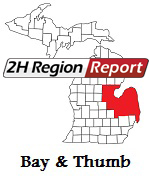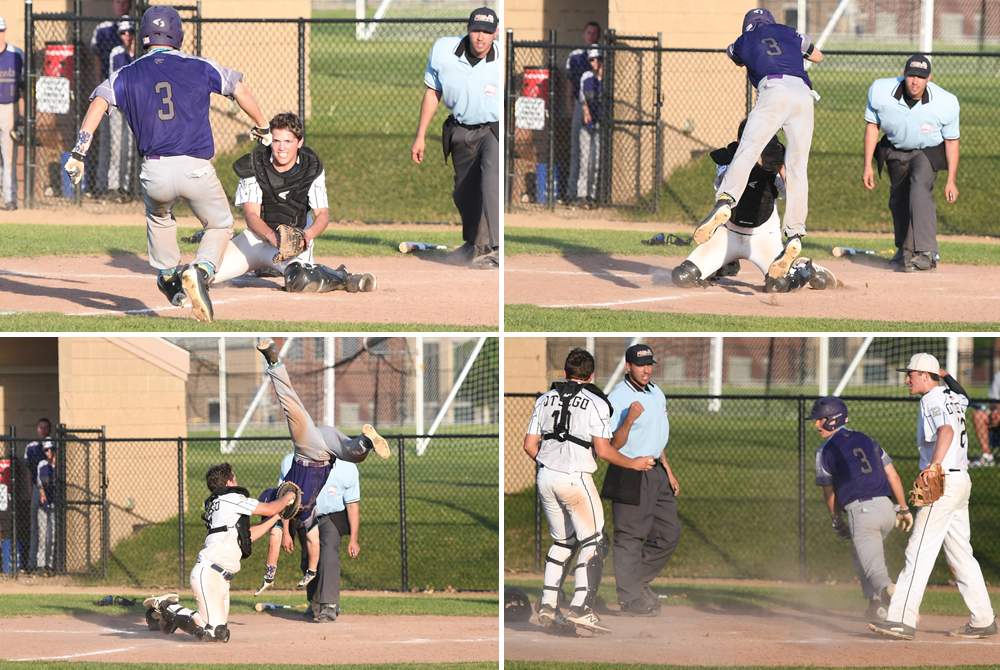
Whymer Made Blue Water Moments into Memories
By
Paul Costanzo
Special for MHSAA.com
September 29, 2020
 When considering all the reasons Jim Whymer was a beloved and Hall of Fame sportswriter in the Thumb area, one stands out above the rest – he cared.
When considering all the reasons Jim Whymer was a beloved and Hall of Fame sportswriter in the Thumb area, one stands out above the rest – he cared.
He cared about the quality of the sports section at the Times Herald in Port Huron. He cared about making sure the impossible task of covering schools and sports as equally as possible was accomplished. And he cared about what the newspaper meant to the community.
But most of all, he cared about the people he was writing about.
“He wasn’t going in it just to get a story – he cared about people,” said Shawn Sharrow, a 1994 Marine City graduate who coached basketball at Marine City and St. Clair. “He cared about relationships. As much as he liked sports, he liked people and building those relationships over the years. After he did an interview with you, he would stand there and talk with you for another half hour. He just wanted to develop those friendships.”
Whymer, who worked at the Times Herald from 1978 through 2012, died this past Thursday of metastatic melanoma. He was 64.
He is survived by his wife, Patty, his children Traci Whymer (Tyson Connolly), Kyle (Amanda) Whymer and Joel (Rachel) Whymer, and his grandson, Finn; and by his mother Teresa, sister Michele Seif and brother Bill (Pattie).
He also is survived by the countless yellowing press clippings with his byline that can be found in hundreds of scrapbooks throughout homes in the Blue Water Area. Clippings that no doubt made special memories that much more special for those holding onto them.
 “I think like no other person I’ve been around, he made kids feel special,” Port Huron Northern boys basketball coach Brian Jamison said. “He had an amazing ability to make kids feel special. It was in his articles and how long he would take to talk to a kid. He would know the kid’s uncle and their cousin, and he would talk to them about that. I think kids genuinely felt better after talking to him.”
“I think like no other person I’ve been around, he made kids feel special,” Port Huron Northern boys basketball coach Brian Jamison said. “He had an amazing ability to make kids feel special. It was in his articles and how long he would take to talk to a kid. He would know the kid’s uncle and their cousin, and he would talk to them about that. I think kids genuinely felt better after talking to him.”
Whymer won several awards for his journalism, including a spot in the Basketball Coaches Association of Michigan Hall of Honor and the Port Huron Sports Hall of Fame.
Good luck finding those awards displayed anywhere, though. Whymer was more interested in making sure the athletes and coaches were getting proper recognition.
“He was really thorough and really interested in what we were doing, even in little old Deckerville when he had Port Huron and Port Huron Northern in his backyard,” Deckerville football coach Bill Brown said. “He’d come up to Deckerville, he’d even go to playoff games – we'd play across the state and he was there. Then after the game, he would just ask you respectful questions. It’s just too bad, because he’s definitely going to be missed. Everybody looked forward to seeing him. He was more than welcome here; he probably could have stayed overnight at someone’s house if he needed to.”
Brown, Jamison and Sharrow had interactions with Whymer as players and coaches. Brown also got to see Whymer as an official, as Whymer worked for more than three decades officiating basketball, baseball, softball and football games throughout the area.
“You can’t even get mad at the guy because he’s such a good guy,” Brown said with a laugh. “He was always square with you.”
Jamison also coached both of Whymer’s sons, and currently has Kyle as his junior varsity basketball coach at Northern. All of the Whymer children played sports at Northern, with Traci being part of an MHSAA title-winning tennis team and Joel setting records on the basketball court and earning a scholarship at Lake Superior State University. (He would later transfer to Grand Valley State.)
 “Jim’s always been more like family to me,” Jamison said. “I think everyone feels that way about him. He’s like your fun uncle that you love to talk to. Jim always did a nice job of keeping the story separate from him being the dad. In that respect, he made it easy on me. He was very, very supportive of his children. That’s something – as special as other people felt – that guy was truly all in for all three of his kids when it came to sports and school. I think he was an ultra-professional, and he didn’t want to overwrite about his kids.”
“Jim’s always been more like family to me,” Jamison said. “I think everyone feels that way about him. He’s like your fun uncle that you love to talk to. Jim always did a nice job of keeping the story separate from him being the dad. In that respect, he made it easy on me. He was very, very supportive of his children. That’s something – as special as other people felt – that guy was truly all in for all three of his kids when it came to sports and school. I think he was an ultra-professional, and he didn’t want to overwrite about his kids.”
After leaving the Times Herald, Whymer began working in the athletic department at St. Clair County Community College, where he continued his quest to make things as special as possible for student athletes. His main duties included scheduling high school and middle school events at the college’s Fieldhouse – whether it be smaller local tournaments or a multi-day holiday basketball showcase that grew to more than 40 teams.
The Fieldhouse can fit more than 2,000 spectators, and Sharrow said if not for restrictions because of COVID-19, a memorial service for Whymer could fill it. That’s likely not an exaggeration.
“He might be showing up at your practice in the last 10 or 15 minutes, and he always walked in the gym with a smile on his face,” Sharrow said. “If he was ever having a bad day, you’d never know it. He made athletes feel important. Even watching him as a coach talking to my players, you could see their faces light up that they were going to be in the paper and that Jim Whymer wanted to talk to them.”
 Paul Costanzo served as a sportswriter at The Port Huron Times Herald from 2006-15, including three years as lead sportswriter, and prior to that as sports editor at the Hillsdale Daily News from 2005-06. He can be reached at [email protected] with story ideas for Genesee, Lapeer, St. Clair, Sanilac, Huron, Tuscola, Saginaw, Bay, Arenac, Midland and Gladwin counties.
Paul Costanzo served as a sportswriter at The Port Huron Times Herald from 2006-15, including three years as lead sportswriter, and prior to that as sports editor at the Hillsdale Daily News from 2005-06. He can be reached at [email protected] with story ideas for Genesee, Lapeer, St. Clair, Sanilac, Huron, Tuscola, Saginaw, Bay, Arenac, Midland and Gladwin counties.
PHOTOS: (Top) Longtime sportswriter Jim Whymer works the phones during his time at the Port Huron Times Herald. (Middle) Whymer also was an MHSAA-registered official for 35 years. (Below) Whymer is survived by his wife Patty and their three children. (Photos courtesy of the Whymer family.)

Be the Referee: Avoiding the Tag
By
Paige Winne
MHSAA Marketing & Social Media Coordinator
May 14, 2024
Be The Referee is a series of short messages designed to help educate people on the rules of different sports, to help them better understand the art of officiating, and to recruit officials.
Below is this week's segment – Avoiding the Tag - Listen
We’re on the baseball diamond today where we’ve got a runner on second with one out.
The batter hits a ground ball that gets through the infield and the runner makes the turn at third, attempting to score. The throw comes in ahead of him, and as he nears home plate he dives head-first over the catcher, avoiding the tag, and touches home plate.
Is this legal?
It is not.
Runners are not required to slide. They can jump or hurdle a fielder if the fielder is lying on the ground. And they can jump over an outstretched arm attempting to make a tag. But diving over a fielder is illegal. The runner is out.
If no contact is made between the runner and fielder, the ball remains live, unless interference is called. If contact is made, the ball becomes dead.
Previous Editions
May 7: Baseball Pitch Count - Listen
April 30: Boys Lacrosse Helmets - Listen
April 23: Softball Interference - Listen
April 16: Soccer Red Card - Listen
April 9: Batted Baseball Hits Runner - Listen
March 12: Basketball Replay - Listen
March 5: Hockey Officials - Listen
Feb. 27: Less Than 5 - Listen
Feb. 20: Air Ball - Listen
Feb. 13: Hockey Penalties - Listen
Jan. 30: Wrestling Tiebreakers - Listen
Jan. 23: Wrestling Technology - Listen
Jan. 9: 3 Seconds - Listen
Dec. 19: Unsuspecting Hockey Hits - Listen
Dec. 12: No More One-And-Ones - Listen
Nov. 21: Football Finals Replay - Listen
Nov. 14: Volleyball Unplayable Areas - Listen
Nov. 7: Pass/Kick Off Crossbar - Listen
Oct. 31: Cross Country Interference - Listen
Oct. 24: Soccer Overtime - Listen
Oct. 17: Tennis Spin - Listen
Oct. 10: Blocked Kick - Listen
Oct. 3: Volleyball Double & Lift - Listen
Sept. 26: Registration Process - Listen
Sept. 20: Animal Interference - Listen
Sept. 13: Feet Rule on Soccer Throw-In - Listen
Sept. 6: Volleyball Jewelry - Listen
Aug. 30: Football Rules Similarities - Listen
Aug. 23: Football Rules Differences - Listen
(PHOTOS by Gary Shook.)

